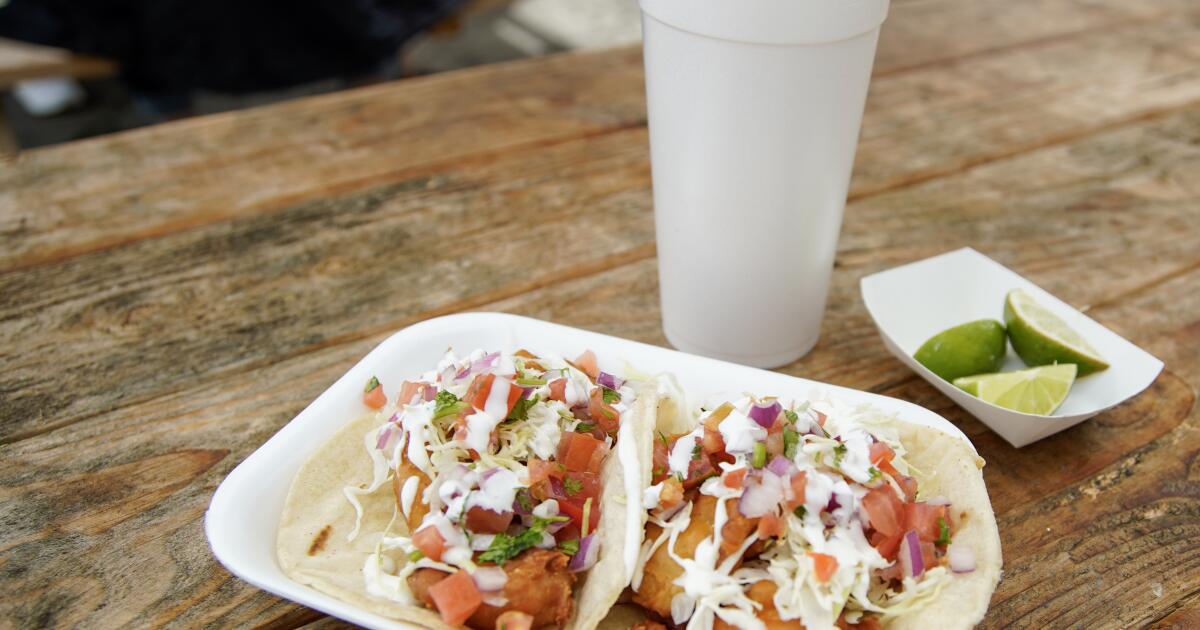

Time has run out for thousands of taco shops, pizza parlors and other small establishments in San Diego that have been using relatively cheap polystyrene foam products to save money.
April 1 marked the end of one-year exemptions from the city’s new polystyrene law that were automatically given to any business with annual revenues of less than $500,000.
San Diego can now issue notices of violation and levy fines against businesses that continue to use foam products, but city officials say they don’t plan to aggressively step up enforcement.
The city recently sent mailers to 9,000 local businesses in four languages to notify them the exemptions are over. Officials also hosted a March 13 webinar for two dozen businesses and sent a mass email to 500 more.
“That was our best data analysis of anybody and everybody that could potentially be impacted,” said Jennifer Ott, a city recycling specialist spearheading enforcement of the ban.
Ott said there are no plans for aggressive enforcement despite the expiration of the exemptions. Since the law took effect in April 2023, the city has relied on following up on complaints from the public instead of visiting businesses, and it will continue with that strategy, she said.
“We are taking an education-focused, business-friendly approach,” she said.
The law bans foam egg cartons, takeout containers, meat trays, coolers, ice chests, dock floats and mooring buoys. Retail stores can’t sell those products, and residents can’t use them at city parks or beaches.
The law also requires businesses serving food only to provide straws and plastic utensils when customers request them. Many restaurants have set up self-service kiosks to comply.
Supporters, including many environmental groups, say foam products poison marine life and damage the health of people who eat seafood, because the foam is not biodegradable and continuously breaks into steadily smaller pieces.
Often sold under the brand name Styrofoam, the products — made of the chemical polystyrene — enter local waterways and easily get consumed by wildlife after they break down into pieces.
San Diego is among more than 130 California cities with such bans, including Carlsbad, Encinitas, Solana Beach, Del Mar and Imperial Beach. Oceanside and Coronado are the only local coastal cities without a ban.
Nearly all national and regional restaurant chains long ago stopped using polystyrene in response to lobbying from environmental groups and backlash from customers concerned that foam isn’t biodegradable.
But the ban is expected to have a big effect on taco shops, pizzerias, convenience stores and other small businesses that continue to use foam products. It also affects some grocery stores and big-box chains.
One exemption the city granted last year hasn’t yet expired. Through the end of 2024, all local grocery stores and big-box chains that sell meat products packaged in foam remain exempt.
The stores, which are represented by the California Grocers Association, said last year that compliance would sharply raise local meat prices because an estimated 80 percent of the meat sold in local grocery stores was using noncompliant packaging.
Ott said that despite the exemption, she has noticed many such businesses starting to comply. For example, Costco stores within the city of San Diego have voluntarily replaced foam meat trays with biodegradable plastic trays.
The exemptions for those businesses were intentionally timed to end when a state polystyrene ban is expected to take effect on Jan. 1 next year.
The state ban takes effect unless recycling of foam products in California reaches 25 percent, which is considered highly unlikely. Recycling rates for such products are typically in the single digits. The city of San Diego accepts such products in residents’ recycling bins, but not all private haulers do.
While the state ban is stricter than the city’s ban and would arguably make the city’s unnecessary, there are questions about how aggressively the state would enforce its legislation.
Mitch Silverstein, a policy manager for the San Diego chapter of the Surfrider Foundation, said his organization remains focused on city foam bans because of uncertainty about state enforcement.
Proposed state regulations and enforcement procedures were released recently, and the state has asked local agencies to comment.
Ott said she expects San Diego to continue its education and enforcement efforts even after the state ban takes effect.
Silverstein said he’s pleased to see San Diego’s exemptions end, stressing that it’s been a particularly long wait in the city. Before the exemptions, San Diego’s ban was delayed three years by litigation from restaurants and container companies.
Silverstein said Surfrider would prefer the city take a more proactive enforcement approach, but he understands it may not have enough personnel.
San Diego has received just 22 complaints during the year the city’s ban has been in effect — seven for alleged violations of the straw and utensil rules and 15 for alleged foam violations.
Ott said the city hasn’t conducted any site visits or engaged in any enforcement efforts. Each of the 22 businesses agreed to fix their violations with help from city officials, she said.
Silverstein said Surfrider sympathizes with affected businesses but stressed that there are many new replacement products for foam that might actually save them money.
San Diego has a long list of recommended products on a city website devoted to the ban, sandiego.gov/environmental-services/recycling/pf-ban.
Complaints about violations of the city law can be emailed to sdrecyclingworks@sandiego.gov. They can also be called into (858) 694-7000.
Ott said the city continues to struggle with third-party food delivery companies, such as DoorDash and Grubhub, doling out utensils even when customers choose not to receive them.
“We have had continued conversations with the major companies that are servicing San Diego,” Ott said. “We’ve heard some conflicting stories about whether it’s the restaurant or the third-party delivery app who have mistakenly included the straws or utensils.”
The city has recommended special training on the new law to the companies, she said.
There is also some confusion about differences between an existing state law governing straws and utensils and the city’s law.
The state law goes beyond the city’s in three ways: The state bans ketchup packets and other condiment packets, but the city doesn’t; the state bans combining multiple utensils in one packet, which the city doesn’t; and the state ban covers single-use utensils made from any material, while the city’s covers only plastic and bio-plastic.
Ott says she is looking forward to a new Surfrider report on beach trash pickups during 2023. She said she hopes it will show a notable reduction of foam compared to 2022.
Silverstein said the report would likely be released around Earth Day, which is April 22. Based on past years, he said foam and other trash from restaurants have been the No. 1 problem at local beaches.







